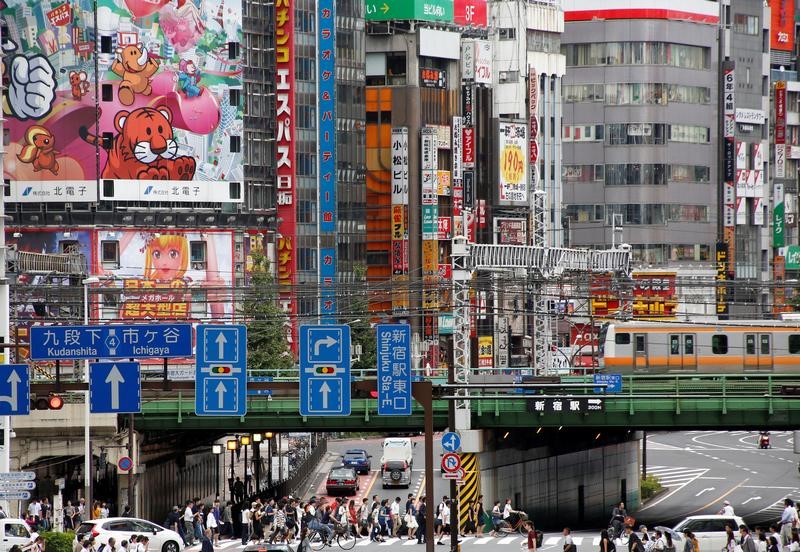(Bloomberg Opinion) -- Next month the Olympic torch will arrive in Japan for a four-month relay to launch the opening ceremonies for the Tokyo summer games. But rather than anticipating the sight of Olympic torchbearers, much of Japan is fixated on a different relay: hundreds of masked passengers grimly walking off the quarantined Diamond Princess cruise ship in Yokohama. The ship has been home to more than 630 Covid-19 infections, the largest cluster in the world outside of Wuhan. Departing passengers all test negative for the virus before release, but public health experts fear the virus is hitching rides with individuals who only show symptoms later.
Moreover, on Sunday, Japan's Health Minister acknowledged that the government is unable to track the route of infections in the country (which total 90). Meanwhile, the Japanese public, long supportive of Prime Minister Shinzo Abe, is losing faith in his ability to cope with the crisis. What might have been a manageable situation is now exposing gaps in Japan's ability to respond to a public emergency.
Japan was not supposed to be in this position. Past global pandemics — such as H1N1 and SARS — emerged from developing countries with poor health-care infrastructure and limited early detection ability for new pathogens. Affluent developed countries are believed to have more or less solved these problems, or at least can afford to manage them in the event of a crisis. Indeed, a 2019 survey ranked Japan 21st out of 195 countries for its ability to prevent, detect, and respond to epidemic and pandemic threats.
Yet as any sports fan can attest, rankings are poor proxies for in-game outcomes. And Japan, with all of its wealth, has not always performed up to its preferred, competent image. Instead, it's dissembled and covered-up for the sake of institutional stability. In the 1980s, Japan’s government initially covered up its failure to stop the use of unheated blood for transfusions, which led to several thousand Japanese hemophiliacs contracting HIV, and lawsuits followed by a multi-million dollar settlement. More recently, in the years following the 2011 meltdown of the Fukushima-Daiichi reactor, TEPCO, the utility that owns it, conceded that it had refused to prepare for disasters for fear that doing so would undermine the reputation of Japan's nuclear industry, and actively covered-up the occurrence of a meltdown (allegedly at the behest of the Japanese Prime Minister's office).
With a projected cost that might reach $28 billion, the Tokyo Olympics aren't just another international sporting event for Japan. Prime Minister Shinzo Abe views them as a critical means of boosting Japan's tourist industry, entrepreneurship, and brand. High aspirations are high risk, especially with the Olympics, which rarely go off flawlessly. Among the almost predictable risks? A pandemic. In 2010, there was serious talk about postponing the Vancouver Olympics due to the H1N1 outbreak, and in 2016, the Zika virus nearly derailed the Rio summer games, with several prominent athletes skipping them.
Yet even with so much recent history to recommend preparedness, Tokyo seemed singularly unprepared when the Diamond Princess docked in Yokohama with 3,700 passengers, and a handful of infected individuals. Over the next two weeks, infections soared on the ship under the eye of Japanese bureaucrats. When a Japanese infectious disease expert (he was on the ground for SARS in 2003 and Ebola in 2014) talked his way onto the ship earlier this week, he found violations of the most basic quarantine procedures, including a failure to wear protective gear when moving between infection-free and contaminated zones of the ship. Meanwhile, scientists have criticized the slow release of epidemiological data from the cruise ship that might illuminate means of transmission — both on the ship, and elsewhere in Japan. The data exists, but so far nobody, including Japan's Ministry of Health, can say when it will be published.
Worst of all, the Japanese government is once again undermining its own credibility and public confidence with mixed messaging. On one hand, it is quietly alarmed and not afraid to tell the public. For example, in recent days, Japan has delayed, canceled, or shrunk public events, from job fairs to the Olympic marathon trials. On the other hand, Prime Minister Shinzo Abe has ruled out cancellation or postponement of the Olympics themselves — the International Olympic Committee boldly claims it has no "Plan B" — presumably for fear of undermining the reputation of an Olympics to which Abe and members of Japan's establishment have hitched their legacies.
The quickening pace of infection in Japan and other parts of Asia could actually be an opportunity for Japan to reset how it approaches public health crises, both during and after the Olympics. Step one might be the most difficult. Despite having a very robust public health system, Japan lacks a scientist-directed disease control agency modeled after the U.S. Centers for Disease Control. Its current system, run by bureaucrats who may or may not know how to manage an epidemic, isn't adequate. Bureaucracies aren't changed in months, but pressure from the International Olympic Committee will speed things along.
Next, breaking with past precedent, the Prime Minister's office should publicly concede that postponement or cancellation of the games might be necessary if the virus isn't brought under control. Such an acknowledgement of institutional fallibility would shake up Japan's moribund bureaucrats and produce the transparency that the international scientific community needs to help Japan — and the world — deal with the virus.
Much can happen between now and the Opening Ceremonies. But if Japan hopes to hold them on time, if at all, it needs to stop treating a public health crisis as a game it can win by simply running out the clock.
